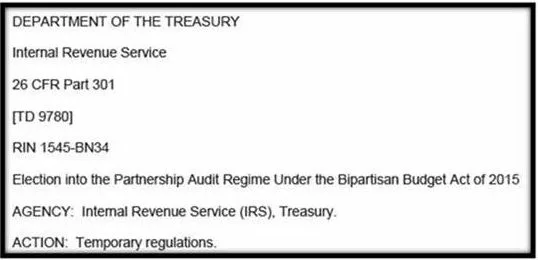
Yesterday (August 4, 2016), the Treasury Department issued its first regulations under the new partnership audit and collection regime found in the Bipartisan Budget Act of 2015. For partnership tax procedures practitioners like me, the regulations are fascinating. While the new regulations will not impact many partnerships and limited liability companies, as the real substantive guidance is forthcoming, the new regulations provide insights into the internal deliberations at IRS headquarters.
The new regulations relate to the early opt-in option – that is, despite the January 1, 2018 effective date, the statute provides that partnerships and LLCs may opt-in to the new regime before the January 1, 2018 date. Quite comically, the preamble addresses what I’ve mentioned on panels before the ABA Tax Section and the DC Bar Tax Section – I’ve suggested that partnership could do an early opt-in to the new regime so that it could opt-out of the regime under section 6221(b). Therefore, audits of partnership with less than 100 partners would have to be conducted under the pre-TEFRA rules. The preamble nixes this strategy.
Interestingly, the new regulations provide that a partnership or LLC can only elect into the BBA rules early if the IRS notifies the partnership that it has been selected for examination. The regulations discuss how the early election is to be made, to whom the early election is sent, and what the early election has to say. To protect itself, the regulation requires that the partnership certify that it is solvent, does not reasonably expect to become insolvent, and has the money to pay any potential tax underpayment. If the partnership is not selected for audit, it can still make an early election if it wishes to file an administrative adjustment request (AAR).
Finally, and quite relevant for partnershiprepresentative.com, the preamble states that “[t]he Treasury Department and the IRS expect to issue additional guidance regarding designation of a partnership representative, including who is eligible to be a partnership representative, under section 6223 as amended by the BBA.?? Of course, any entity that opts-in to the new regime must designate a partnership representative at that time.
A New Era of Partnership Representation Before the IRS
Search
Recent Blog Posts
- Surge in BBA Partnership Audits Expected in 2022
- IRS Releases Memo Concerning Access to Administrative File in TEFRA and BBA Examinations
- IRS Provides Penalty Relief for New Capital Reporting Requirements
- IRS Releases Proposed Regulations on Centralized Partnership Audit Regime
- Centralized Partnership Audit Regime Website Launched by IRS
- Partnership Filing Relief
- IRS Issues LB&I Memorandum
- IRS Release Clarifications for Form 8082
- IRS Release Draft Instructions to Form 8978
- IRS Releases Interim Guidance Centralized Partnership Audit Regime
Bios
Archives
- January 2022
- April 2021
- January 2021
- November 2020
- September 2020
- April 2020
- March 2020
- February 2020
- November 2019
- October 2019
- July 2019
- March 2019
- January 2019
- December 2018
- November 2018
- September 2018
- January 2018
- October 2017
- August 2017
- July 2017
- May 2017
- February 2017
- January 2017
- November 2016
- October 2016
- September 2016
- August 2016
